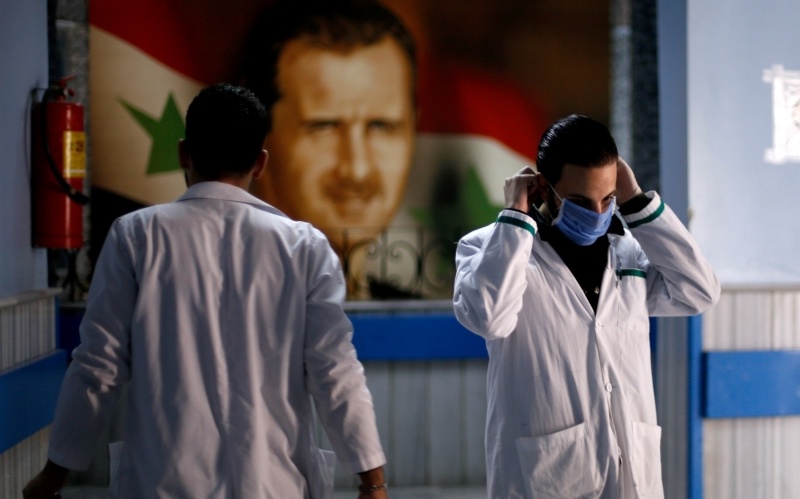Medical personnel in Damascus, Syria, March 19, 2020 (Omar Sanadiki/Reuters)
The Assad regime has tipped off its concern over Coronavirus and economic crisis, through a State news agency report on Sunday’s Cabinet meeting.
SANA reports that, in the session chaired by recently-appointed Hussein Arnous:
[Ministers] called on all ministries, authorities, and private sector establishments to commit fully to health regulations such as disinfection, hygiene, maintaining safe distances among employees, providing services to citizens in an organized manner, and reducing crowding, due to the increasing number of Coronavirus cases recently.
The regime has only acknowledged 204 cases of the virus. Officials have announced seven deaths.
Medics, activists, and residents believe the actual toll is far higher.
Health Minister Nizar Yazigi, briefing the Cabinet, pointed to a hot spot of the virus. He said tests were being conducted with “all the people who had been in contact with the infected people in the Jdeidet al-Fadel area” in Damascus Province.
Despite the rise in cases, the regime lifted an overnight curfew in late May, and allowed travel between provinces.
See Syria Daily, May 26: Coronavirus — Official Surge in Cases, But Regime Lifts Restrictions
The Cabinet also discussed the regime’s deteriorating economic situation. SANA implicitly refers to rampant inflation — “securing the basic needs for citizens at suitable prices” — and to shortages with the call on the Trade and Economy Ministries “to ensure the availability of essential goods at the Syrian Trading establishment outlets”.
Syria’s GDP has declined more than 75% since the uprising began in March 2011. Food, fuel, and basic goods are in short supply, driving up prices.
Russia, the regime’s main backer, is showing concern over corruption and its failure to secure a share of Syrian resources, in return for i ts 2015 military intervention saving Bashar al-Assad and his inner circle.
New US sanctions, under the “Caesar Act” citing the regime’s crimes against humanity, came into effect last week. The European Union renewed its sanctions on May 28 over “violent repression”.
See Syria Daily, June 19: In Economic Crisis, Regime Seeks Rallies Against “Caesar Act” Sanctions

